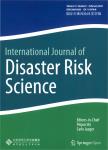Climate Change, Water Scarcity, and Health Adaptation in Southwestern Coastal Bangladesh
Climate Change, Water Scarcity, and Health Adaptation in Southwestern Coastal Bangladesh作者机构:Department of Soil Science Bangladesh Agricultural University Department of Geography and Environmental Sciences/Disaster and Development Network (DDN) Northumbria University Department of Agricultural Extension Ministry of Agriculture Graduate School of Media and Governance Keio UniversityShonan Fujisawa Campus (SFC)
出 版 物:《International Journal of Disaster Risk Science》 (国际灾害风险科学学报(英文版))
年 卷 期:2019年第10卷第1期
页 面:28-42页
核心收录:
学科分类:082802[工学-农业水土工程] 07[理学] 070601[理学-气象学] 08[工学] 0828[工学-农业工程] 0706[理学-大气科学]
主 题:Climate change Health risks Safe water scarcity Southwestern Bangladesh Waterborne diseases
摘 要:Climate change may affect human health through multiple and interactive pathways that include safe water scarcity. However, impacts of climate change-induced water scarcity on health and well-being are *** 80% of illnesses in developing countries are attributed to unsafe drinking water and waterborne diseases. In Southwestern Bangladesh, lack of safe drinking water is a severe crisis due to climate change. The study investigated the impacts of climate change on water resources and human health in a coastal area. A questionnaire survey was carried out in two villages of Shymnagar upazila on the southwestern coast to investigate the present status of safe water sources and health care facilities and their impacts on the local community. The results show that the local community believes that climate change is having substantial impacts on freshwater sources and health. More than 70% of the respondents identified diarrhea, dysentery,and skin diseases as the prime waterborne health risks that occur through climate-related safe water scarcity. By synthesizing the ground data, we suggest pathways to health adaptation to climate change effects and safe water scarcitythrough locally available adaptive practices such as the use of pond sand filters, rainwater harvesting, and importing potable water with the active participation of the government,nongovernmental organizations, and communities.



